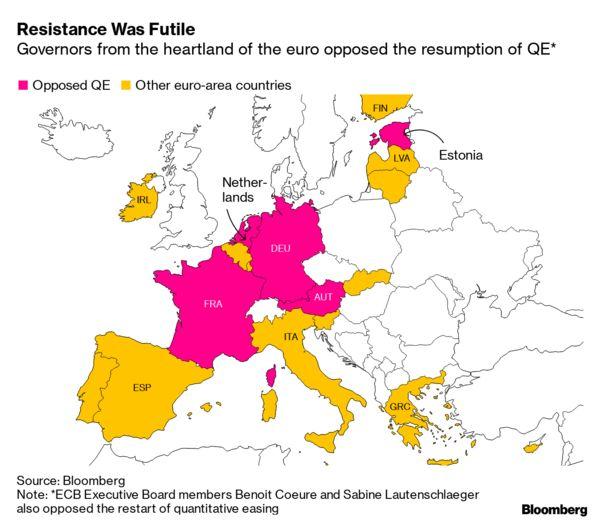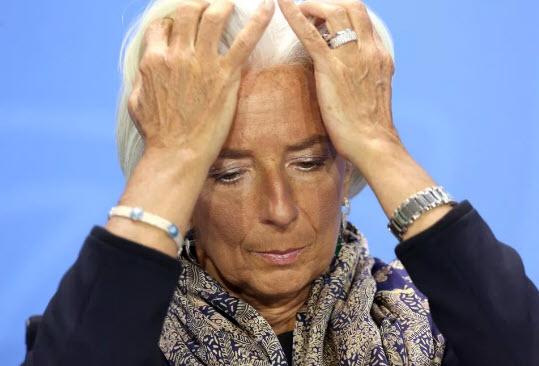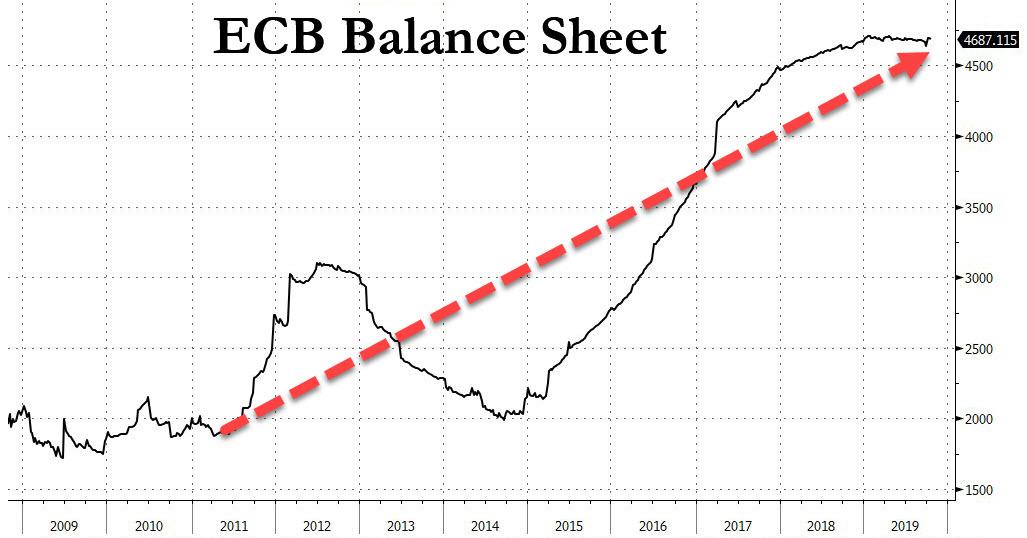Lagarde
heeft afgelopen vrijdag de baan van topgraaier Draghi als president van de Europese Centrale Bank (ECB) overgenomen, ook al heeft zij bepaald geen financieel economische opleiding gevolgd. Alle hoop van een aantal centrale banken in de EU
op een ander beleid dan dat van Draghi werd vrijwel onmiddellijk de
grond ingeboord. Vreemd overigens die verwachting, immers Lagarde is ook verantwoordelijk voor de gore spelletjes die het IMF sinds 2011 heeft gespeeld, in dat jaar werd ze directeur van deze inhumane neoliberale organisatie.....
Overigens, Lagarde is in feite een veroordeelde misdadiger, die haar straf van een jaar gevangenisstraf ontliep daar er anders een crisis in het IMF zou zijn ontstaan, dit nadat haar voorganger en verkrachter Strrauss-Kahn het veld moest ruimen..... Ongelofelijk daarom ook dat de ondemocratische EU Lagarde koos als topgraaier van de ECB.......
Lagarde nam haar functie bij de ECB op o.a. door Nederland en Duitsland te manen hun overschot
te investeren, voorts begon Lagarde te zeuren over onderlinge 'solidariteit', ofwel steek ook je kont diep in de schulden. Wat betreft het 'beleid' van Draghi: Lagarde gaat gewoon door op de doodlopende weg die Draghi eerder heeft bewandeld: obligaties
van landen opkopen en het verlagen van de rente tot nog verder onder
de – 0,5%, die nu al ingevoerd wordt (zo ongeveer de laatste actie van Draghi), ofwel een rente die nog verder onder het
'nulpunt' zal dalen, anders gezegd: negatieve rente (waarmee geld lenen zelfs geld zou moeten opleveren, al zal dat 'natuurlijk niet' voor het gewone volk opgaan...)....
Dat
daardoor een flink aantal mensen in de problemen komt interesseert
autocraat Lagarde net zo min als haar voorganger Draghi, schijt aan de pensioenen die mensen hun
werkende leven lang hebben opgebouwd, dokken en niet zeuren....... Ook de kleine spaarders kunnen wat Lagarde betreft doodvallen, ze durfde keihard te zeggen
dat je beter een baan kan hebben dan geld op de bank..... Moet je
nagaan: de misdadige dweil Lagarde gaat een inkomen verdienen van rond de 4 ton op
jaarbasis is en dat is exclusief een gigantische onkostenvergoeding......
Taaie
stof mensen, het hieronder opgenomen artikel van Tyler Durden, maar zeer de moeite van het lezen waard (het artikel werd eerder gepubliceerd op Zero Hedge). Daaronder een verduidelijking over QE ofwel Quantitative Easing, een artikel
van Investopedia, QE of het waanzinnige beleid van Draghi om zoveel
mogelijk obligaties van EU landen op te kopen (ook werden schulden van banken in Zuid-Europa opgekocht, waardoor de Grieken de regie in eigen land zijn kwijtgeraakt en nog steeds diep in de ellende zitten...)....
De ECB heeft
overigens al aangekondigd, na de stop van één jaar, opnieuw bonussen ter waarde van
20 miljard euro op te willen kopen, ook al is het allesbehalve
duidelijk of dit ook maar iets heeft opgeleverd voor de EU, behalve
dan dat de drukpersen voor papiergeld overuren maakten en ons geld in
feite steeds minder waard werd ook al merken we daar nu nog weinig
van..... (dat gebeurt als de volgende crisis zich aandient en zoals je weet die komt eraan, de vraag is wanneer precies)
Lagarde:
"We Should Be Happier To Have A Job Than To Have Savings"
Mon,
11/04/2019 - 06:12
Any
hopes that the replacement of Mario Draghi, who on Halloween left the
ECB more polarized than ever, as the core European nations revolted
against the Italian's profligately loose monetary policy in an
unprecedented public demonstration
of discord within
the European Central Bank...
...
with the ECB's new head, former IMF Director and convicted
criminal,
Christine Lagarde would result in some easing of tensions, were
promptly crushed when Lagarde picked up where Draghi left
off, calling
on Germany and the Netherlands to use their budget surpluses to fund
investments that would help stimulate the economy, in
a sharp rebuke that will not win the former French finance minister
any friends in fiscally conservative Germany.
In
an appeal to Germany's sense of solidarity, and in hopes that
Germany's memory of hyperinflation has faded enough, Lagarde said
that there "isn’t enough solidarity" in the single
currency area, adding: “We share a currency, but we don’t share
much budgetary policy for now."
"Those
that have the room for manoeuvre, those that have a budget surplus,
that’s to say Germany, the Netherlands, why not use that budget
surplus and invest in infrastructure? Why not invest in education?
Why not invest in innovation, to allow for a better rebalancing?"
asked Lagarde, blaming Germany and the Netherlands for living within
their means, and demanding they should no longer do so, just
because most other Europeans decided to pull a page out of the
American playbook, and live exorbitantly outside of
their means.
Lagarde's
direct attempt at shaming Europe's fiscal conservatives was nothing
short of shocking: normally ECB officials avoid naming individual
countries in public statements, because their mandate is to act in
the interests of the eurozone as a whole. But when Lagarde made her
speech she had not yet officially taken over at the Frankfurt-based
institution — she succeeds Mario Draghi on Friday.
We
somehow doubt this "explanation" will fly with the German
population, which sees itself as funding peripheral Europe's
profligate ways for the past decade, even as it benefited from the
weak euro to supercharge the German export machine.
And
just to guarantee she is as resented by Germany as was Mario Draghi,
she said that the German and Dutch governments, which last year had
budget surpluses of 2% and 1.5% respectively, "have
not really made the necessary efforts," she
added, referring to establishment's increasing desperation to force
anyone with an even remotely normal balance sheet to sink to the same
level as their insolvent peers.
As
for the punchline, Lagarde defended the negative interest rates
introduced by her predecessor Draghi, arguing
that people should be happier to have a job than a higher savings
rate. This,
as a reminder, comes at a time when virtually everyone who
is not named
"Draghi" or "Lagarde" thinks that negative
rates are catastrophic,
and assure doom for the Eurozone.
When
asked about the impact of negative rates on savers, Ms Lagarde said
on Thursday that they should think about how much worse the situation
would be if the ECB had not cut rates as much as it had.
“Would
we not be in a situation today with much higher unemployment and a
far lower growth rate, and isn’t it true that ultimately we
have done the right thing to act in favor of jobs and of growth
rather than the protection of savers?” she
asked.
The
unemployment rate in the 19-country eurozone has fallen from 12 per
cent in 2013 to 8.2 per cent last year. GDP growth in the single
currency zone was 1.8 per cent last year and the ECB expects it to
slow to 1.1 per cent this year.
Finally,
for those curious if the authorities will stop
at anything to
destroy the currency and send rates to even more negative levels if
it means kicking the can on a global, populist uprising, by just a
few months, weeks or days, here is the answer: "We
should be happier to have a job than to have our savings
protected," said
Lagarde.
"I
think that it is in this spirit that monetary policy has been decided
by my predecessors and I think they made quite a beneficial choice."
Let's
check back on that statement in a year, shall we?
Of
course, there is no magic solution here: all the ECB has done is kick
the can, and ensure that the next crisis will be even worse than if
some semblance of a price-clearing reality had been allowed under
Draghi's 8 years. Instead, the ECB's balance sheet exploded to €4.7
trillion euros, as the world's largest central
bank-cum-hedge fund bought every bond in sight in hopes
of keeping asset prices artificially elevated.
In
October, the ECB, less than a year after it ended QE*
in a failed attempt to "renormalize" monetary policy,
announced it would cut rates to a record -0.5% and unveiled
open-ended plans to start buying €20bn of bonds starting in
November.
Needless
to say, the comments by the former French finance minister confirm
market expectations that she is likely to pursue similar monetary
policy strategy to Draghi who flooded the financial system with cheap
money to fight slowing growth and inflation while calling on
governments to do more through fiscal policy to take the burden off
the central bank.
In
the end, the consequences of Draghi's monetary policy, as we
explained before, will
be catastrophic,
but the former Goldman partner was wise enough to get off the
European Titanic before it hit the iceberg. It will now be Lagarde's
task to save as many people as possible once the ship starts sinking,
and judging by her remarks, she is perfectly fine of not only going
down with the ship, but also being blamed for the collision.
Tags:
Business
Finance
===============================
*
Hieronder de uitleg over QE of: Quantitative Easing, geschreven door Jim
Chappelow en gepubliceerd op Investopedia (zie ook het eerste
staatje in het artikel van Durden):
Quantitative
Easing (QE)
What
Is Quantitative Easing? (QE)
Quantitative
easing is an unconventional monetary
policy in
which a central bank purchases government
securities or
other securities from the market in order to increase the money
supply and encourage lending and investment. When short-term
interest rates are at or approaching zero, normal open
market operations,
which target interest rates, are no longer effective, so instead a
central bank can target specified amounts of assets to purchase.
Quantitative easing increases the money
supply by
purchasing assets with newly created bank reserves in order to
provide banks with more liquidity.
KEY
TAKEAWAYS
Quantitative
easing (QE) is the name for a strategy that a central bank can use
to increase the domestic money supply.
QE
is usually used when interest rates are already near 0 percent and
can be focused on the purchase of government bonds from banks.
QE
programs were widely used following the 2008 financial crisis,
although some central banks, like the Bank of Japan, had been using
QE for several years prior to the financial crisis.
Understanding
Quantitative Easing
To
execute quantitative easing, central
banks increase
the supply of money by buying government
bonds and
other securities. Increasing the supply of money is similar to
increasing supply of any other asset—it lowers the cost of money.
A lower cost of money means interest
rates are
lower and banks can lend with easier terms. This strategy is used
when interest rates approach zero, at which point central banks have
fewer tools to influence economic growth.
If
quantitative easing itself loses effectiveness, fiscal
policy (government
spending) may be used to further expand the money supply. In effect,
quantitative easing can even blur the line between monetary and
fiscal policy, if the assets purchased consist of long term
government bonds that are being issued to finance counter-cyclical
deficit spending.
The
Drawbacks of Quantitative Easing
If
central banks increase the money supply, it can cause inflation.
In a worst-case scenario, the central bank may cause inflation
through QE without economic growth, causing a period of
so-called stagflation.
Although most central banks are created by their countries'
government and are involved in some regulatory oversight, central
banks can't force the banks to increase lending or force borrowers
to seek loans and invest. If the increased money supply does not
work its way through the banks and into the economy, QE may not be
effective except as a tool to facilitate deficit spending (i.e.
fiscal policy).
Another
potentially negative consequence is that quantitative easing
can devalue the
domestic currency. For manufacturers, this may help stimulate growth
because exported goods would be cheaper in the global market.
However, a falling currency value makes imports more expensive,
which can increase the cost of production and consumer price levels.
Is
Quantitative Easing Effective?
During
the QE programs conducted by the U.S.
Federal Reserve starting
in 2008, the Fed increased the money supply by $4 trillion. This
means that the asset side of the Fed's
balance sheet grew
significantly as it purchased bonds, mortgages, and other assets.
The Fed's liabilities, primarily reserves at
U.S. banks, grew by the same amount. The goal was that the banks
would lend and invest those reserves to stimulate growth.
However,
as you can see in the following chart, banks held onto much of that
money as excess reserves. At its peak, U.S. banks held $2.7 trillion
in excess reserves, which was an unexpected outcome for the Fed's QE
program.
(voor de staat die hier hoort te staan,
zie het origineel)
Most
economists believe that the Fed's QE program helped rescue the U.S.
(and world) economy following the 2008 financial crisis. However, the
magnitude of its role in the subsequent recovery is more debated and
impossible to quantify. Other central banks have attempted to deploy
QE to
fight recession and deflation with
similarly cloudy results.
Following
the Asian
Financial Crisis of 1997,
Japan fell into an economic recession.
Beginning in 2000, the Bank
of Japan (BoJ) began
an aggressive QE program to curb deflation and to stimulate the
economy. The Bank of Japan moved from buying Japanese government
bonds to buying private debt and stocks. The QE campaign failed to
meet its goals. Ironically, the BoJ governors had concluded that "QE
was not effective" just months before launching their program
in 2000. Between
1995 and 2007,
Japanese GDP fell from $5.45 trillion to $4.52 trillion in nominal
terms, despite the BoJ's efforts.
The Swiss
National Bank (SNB) also
employed a QE strategy following the 2008 financial crisis.
Eventually, the SNB owned assets nearly equal to annual economic
output for the entire country, which made the SNB's version of QE
the largest in the world as a ratio to GDP.
Although economic growth has been positive during the subsequent
recovery, how much the SNB's QE program contributed to that recovery
is uncertain. For example, although it was the largest QE program in
the world as a ratio to GDP and interest rates were pushed below 0%,
the SNB was still unable to achieve its inflation targets.
In
August 2016, the Bank
of England (BoE) announced
that it would launch an additional QE program to help alleviate
concerns over "Brexit."
The plan was for the BoE to buy 60
billion pounds of
government bonds and 10 billion pounds in corporate debt. If
successful, the plan should have kept interest rates from rising in
the U.K. and stimulated business investment and employment.
From
August 2016 through June 2018, the Office
for National Statistics in
the U.K. reported that gross fixed capital
formation (a
measure of business investment) was growing at an average quarterly
rate of 0.4 percent, which was lower than the average from 2009
through 2018. The challenge for economists is to detect whether
growth would have been worse without quantitative easing.





